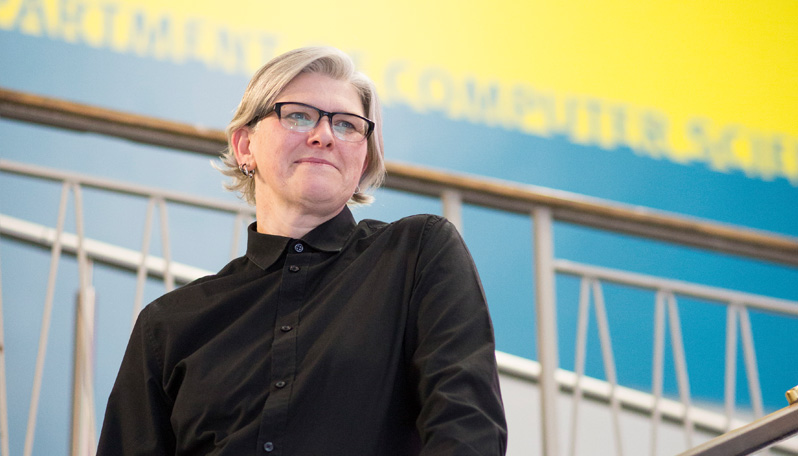How to help build AI for everyone (even if you're not technical)
Maybe you have zero technical experience as a programmer or user-experience designer of artificial intelligence (AI) systems. Maybe you’ve never even written a line of code in your life. Still, there are actions that you–and your community–can take today if you’re inspired to help make AI-enabled products that are useful and accessible to people around the world.
Over the last year, I’ve given introductory, action-oriented talks on this topic to non-technical audiences in a variety of communities. These audiences have ranged from small business owners gathered at the National Minority Supplier Development Council’s annual conference in Detroit to entrepreneurs in the tourism industry in Haiti; from senior business enterprise executives in Chicago interested in expanding their audiences globally to an organization for LGBTQ+ high school students in New York.
Here, I’ll share the same information on how anyone can help train ML and AI systems by contributing data from a diversity of communities, to work toward reflecting the diversity of the world.
How AI helps build more inclusive products
First, it’s helpful to understand what the term “AI” means. AI is the science of making machines intelligent, so they can recognize patterns and get really good at helping people solve specific challenges or sets of challenges.
For example, AI has helped teams at Google improve how our systems recognize dozens of languages. This comes in handy as more people search for information online. In this way, AI can help improve the inclusivity of our products and fuel not only audience growth, but also increased opportunities for users around the globe.
A dominant technique in developing effective AI is Machine Learning (ML). ML is a term which some people may use interchangeably with AI, but they are not the same exact thing. ML is used to develop AI, by getting computers to do something without being programmed with super-specific rules. ML can help machines recognize patterns and adjust to unique situations...like offering voice search results in a growing variety of languages and accents as more people adapt this form of search.
How you and your community can contribute to more inclusive AI
Now that you have a very basic definition of what AI Is, you can begin to contribute to creating inclusive, AI-fueled products. AI systems learn from data, and Google has a few free, open resources for anyone around the world to help train Google ML models. Models are simply the mathematical equations that represent the steps an intelligent machine will complete to make a decision. When people from a variety of different perspectives collaborate to share data, they can help researchers and scientists build increasingly inclusive ML algorithms.
Here are a few resources to help you take action immediately:
- Quick, Draw! This Google Creative Lab Experiment is an online game that prompts players to draw simple, internationally-recognizable objects such as shoes or chairs so a machine can guess what’s being drawn. In the first year after its launch in late 2016, Quick, Draw! has garnered over a billion drawings from countries as diverse as Brazil, South Africa, and China. It’s become the world’s largest dataset of doodles; we've opened up dozens of millions of these drawings for anyone to access. And now Quick, Draw! is available in more than a dozen local languages, including Arabic, Portugese (for both Portugal and Brazil), and Chinese (for China, Hong Kong and Taiwan).
- Crowdsource This site empowers anyone to help train Google’s own machine learning models by labeling images, translating handwritten material and validating the sentiment of written phrases. You can also share images that show daily objects to help co-create an open data set of global images on the free app version. These contributions directly influence all of our AI systems, which users experience when using apps such as Photos, Maps, and Translate in their daily lives. To date, people have contributed from over 190 nations around the world.
- Conversation AI Jigsaw is a technology incubator team that deals with some of the world’s most challenging geopolitical problems. One challenge Jigsaw is working on is improving conversations online, with tech that helps flag and score toxic comments. It’s been used on sites such as Wikipedia and The New York Times. Jigsaw encourages anyone around the world to contribute examples of comments (both comments you want in your community and comments you don’t want in your community) for use in research and products. You can submit examples here.
Free tools and training for your next steps
This is just a sampling of tools we offer non-technical audiences interested in taking action to help build inclusive AI systems.
You can learn how our researchers are working to advance AI for everyone, take online self-study courses to start becoming an ML practitioner, browse open datasets provided for the research community, and more on the Google AI site)
We hope you’ll join us, as our teams aim not only to build AI for everyone, but with everyone.
Contact Us
Stay in touch. We want to hear from you. Email us at Acceleratewithgoogle@google.com
Please note that this site and email address is not affiliated with any former Google program named Accelerator.



